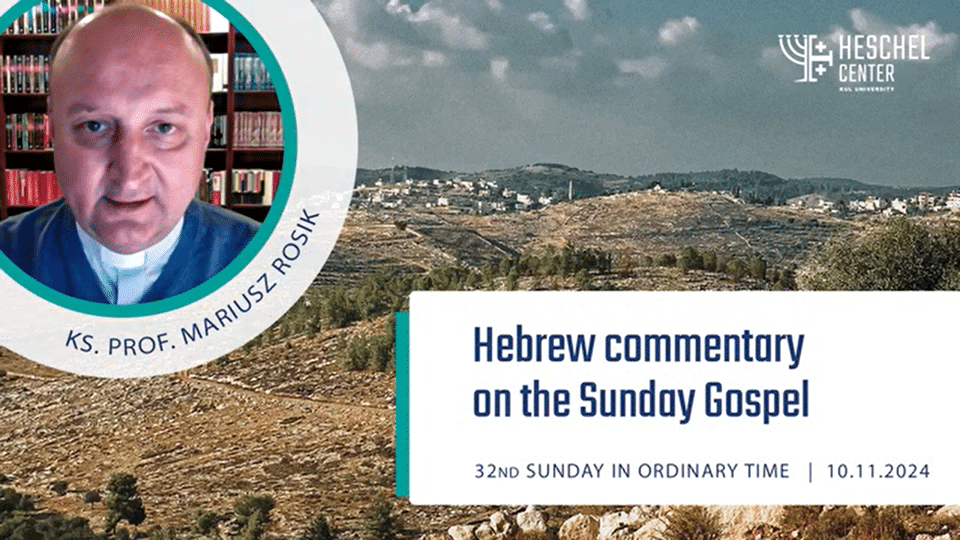Heschel Centre for Catholic-Jewish Relations at the Catholic University of Lublin
10 November, 2024
4 min
The Poor Widow – A Symbol In Judaism Of Abandonment
“The term “poor widow” has become a symbol in Judaism of abandonment and total lack of livelihood. Since she is the one entitled to help from the wealthy, her gift, though meager, seems surprisingly large”, stresses Rev. Prof. Dr. Mariusz Rosik, biblical scholar, in his commentary for the Catholic University of Lublin Heschel Center for the […]

“The term “poor widow” has become a symbol in Judaism of abandonment and total lack of livelihood. Since she is the one entitled to help from the wealthy, her gift, though meager, seems surprisingly large”, stresses Rev. Prof. Dr. Mariusz Rosik, biblical scholar, in his commentary for the Catholic University of Lublin Heschel Center for the Sunday, November 10.
In today’s Gospel, Jesus contrasts the attitudes of the scribes and the poor widow. The scribes, known in the literature as scribes or doctors of the Law mainly were Pharisees. Representing the intellectual and spiritual elite, they studied and explained religious questions. They were well-versed in the 613 rules of the Torah and sought to implement them scrupulously.
Jesus mentions several examples of the hubris and hypocrisy of these leaders of the nation: donning flowing robes, indulging in greetings in the marketplace, occupying the first chairs in synagogues and at feasts, praying long prayers for the sake of appearances, and taking advantage of the kindness of widows. Robes indicate a person’s social position. Wearing long robes could mean elevating oneself above others. The opulence of dress may have shamed the poor and built a social distance that should not be present in God’s people. The predilection for greetings is also a sign of pride, for the socially inferior person should be the first to utter a greeting; it is evident that the scribes were looking forward to this. The first seats in the synagogues and at the feasts are also an obvious manifestation of pride. In the synagogues, these were chairs placed directly opposite the bimah, and at the feasts, they were placed next to the house host. Prayers for the sake of appearances indicate a desire to please people, not God. But the worst is the last accusation: overeating in the homes of widows. The situation of widows in Israel, in a patriarchal society, was very difficult, especially materially, and the allegation is precisely about the material exploitation of these women.
The situation of widows looked complicated, and there was a need for regulations that could enable a woman who had lost her husband to live decently (Ex. 22:21; Deut. 10:18; 24:17-21; 26:12-13; 27:19). The term “poor widow” has become a symbol in Judaism of abandonment and total lack of livelihood. Since she is the one entitled to help from the wealthy, her gift, though meager, seems surprisingly large. The editorial addition makes its value more significant: “all that she had for sustenance.” The pericope does not reveal the woman’s motives for making the sacrifice. However, since it was a voluntary sacrifice, one may assume that the only motive was love for God dwelling in the temple. In a place where God’s presence is particularly intense, the love and generosity of the woman, a poor widow, is particularly intensely manifested. The disciples of Jesus, if they are to become the “new temple,” are called to imitate the poverty of the widow by replacing the pursuit of material goods (as the temple staff does) with an inward disposition of giving everything to God; the widow’s total love for God, expressed in the practice of the commandment to love God and neighbor; and the poor widow’s faith, expressed in total trust in God after giving everything one has to Him. The poor widow gains recognition in the eyes of Jesus since her generosity to the temple stems from her inner adherence to God.
In today’s Gospel, Jesus contrasts two attitudes. We can call them perfectionism and holiness. The saint sins and, with repentance, rises from his fall. The perfectionist avoids the slightest imperfection that others might see. The saint focuses on loving others, noticing their needs from afar, and meeting them. The perfectionist focuses on himself to prove himself perfect. This is mere self-love. The saint savors the presence of God. He enjoys talking with Him in prayer. A perfectionist in such a situation glances at his watch now and then, thinking that God is still looking at his imperfections. The scribes turned out to be perfectionists. The poor widow was a saint.
About the author:
Related

Overcoming Emotional Dependence: A Guide with Psychologist Mónica Caballero
Proyecto Ánima
28 March, 2025
2 min

Addictions and Sexuality
José Miguel Ponce
28 March, 2025
2 min

The Chosen: A Series That Wins Hearts in Its Own Language
Mar Dorrio
27 March, 2025
4 min

Being a Christian of One Piece: Integrity and Coherence in the Life of Faith
Patricia Jiménez Ramírez
26 March, 2025
2 min
 (EN)
(EN)
 (ES)
(ES)
 (IT)
(IT)

